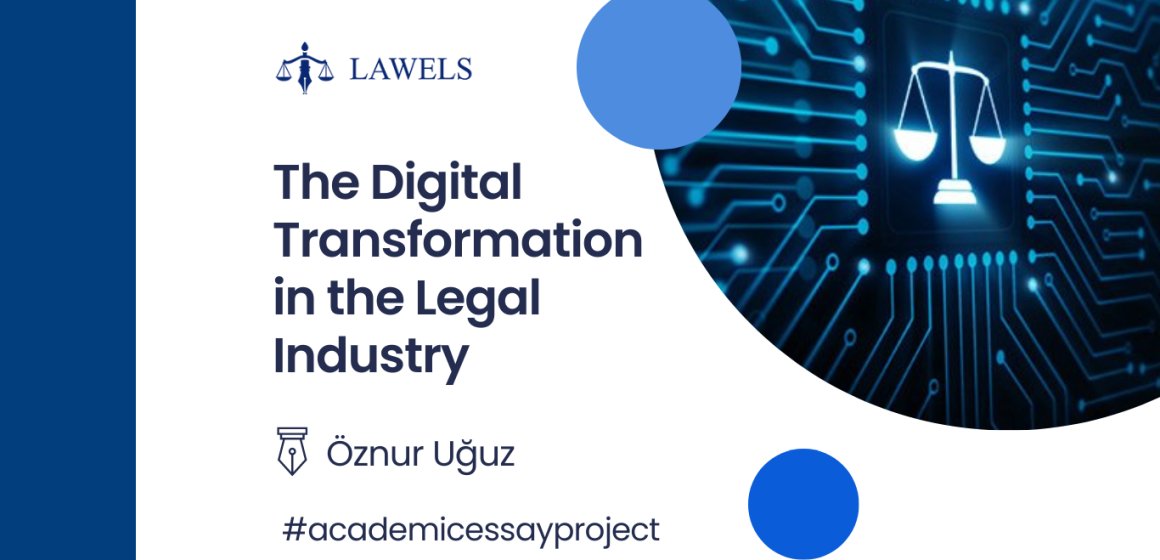Author: Öznur Uğuz, MSc in European Economy and Business Law at Tor Vergata University of Rome, 2021-2023, e-mail: [email protected]
Legal Editor: Bader Kabbani, LLM International Commercial and Economic Law, SOAS, University of London, 2020-2021, e-mail: [email protected]
Abstract
The rapid technological advancement of recent years has sowed the seeds of a digital trend in a wide range of industries varying from finance to entertainment. Like many others, the legal industry has received its fair share of this ongoing trend and has entered a phase of digital transformation. Ultimately, this has brought about unprecedented changes to how and by whom legal services are provided. In this article, I will briefly discuss how technology is utilised in the legal industry as well as how digital transformation affects legal professionals.
What is Digital Transformation?
Digital transformation can be defined as the integration of digital technologies into all aspects of an organisation with an aim to improve business operations and meet changing industry and client expectations. The digital transformation in the legal industry is comprised of the digitization of various aspects of legal services ranging from service delivery to team collaboration and client interaction. Today’s technology is offering a number of cost and time-efficient solutions to legal professionals such as document automation, e-discovery, virtual legal assistants, and digital contract and case management tools. These solutions are powered by advancements in cutting-edge technologies such as blockchain, cloud services and artificial intelligence which encompasses natural language processing and machine learning. The utilisation of these advanced technologies by law firms not only increases the efficiency and quality of legal services but also reduces their costs by maximising the billable hours spent on tasks. In a broader sense, the use of legal technology tools also mitigates the risks of human errors and the unexpected liabilities that may arise from them.
Losing Jobs to Technology
Although the use of technological solutions in time-consuming and repetitive tasks allows legal professionals to dedicate their time and effort to more intellectually demanding tasks, the taking over of a substantial part of legal work by technology tools poses a threat to certain legal occupations. According to the latest prediction of the Law Society of England and Wales, 13.000 jobs in the legal services sector are to be lost to technology by 2027. Legal secretaries and office support roles, who usually perform less-skill-demanding tasks, are likely to be the most affected by this trend. In this regard, paralegals and trainee solicitors also seem to be at risk as they, too, often engage in repetitive and less sophisticated work that can be handled much faster by legal technology tools.
New Roles Emerging in the Legal Industry
While some of the lower-skilled roles are projected to disappear in the future, new roles are emerging to respond to the changing demands of the digital age. The legal engineer role is one of those that are expected to be an integral part of law firms in the years ahead. A legal engineer, also known as a legal technologist, can be defined as the link between legal expertise and technological solutions. They optimise existing products, services, and processes and develop digital solutions to legal problems by applying a scientific approach. Another role emerging in the legal industry is the litigation support specialist, which can be described as a professional who is responsible for assisting attorneys with complex lawsuits by handling organisational tasks such as building or maintaining databases, reviewing documents and retrieving records. The role has been developed due to the growing use of electronic litigation databases in legal services and is expected to gain a growing presence in law firms in the coming years.
Moreover, the expanding client expectations have resulted in an increasing demand for legal project managers who help law firms enhance their legal services by ensuring better planning and management of legal tasks with the most effective use of time and resources. In-house data scientist, innovation manager and business analyst roles are other occupations that are likely to gain more presence in law firms in the years ahead.
A New Set of Skills for Today’s Legal Professionals
This new era calls for a new generation of legal professionals with an innovative perspective and a new skill set to help them keep up with the shifting of legal services from a practice-centric and labour-intensive industry to a skill-oriented one. Flexibility and adaptability are the essential skills that today’s legal professionals must possess in order to respond to the changing demands of the market and clients in time. Future-facing legal professionals should be open to change and new perspectives and must have the ability to think outside the box to come up with novel solutions to the challenges of the digital age. Technological literacy is instrumental for the most effective implementation of technological solutions, while data analytics and project management are further skills that could give legal professionals an upper hand in the competitive legal market. Finally, interpersonal skills and emotional intelligence are now more important than ever before as those are human-centric skills that cannot be mimicked by technology, which is expected to eventually replace some traditional legal occupations in the industry.
How We Respond to Change Will Determine the Future
Technology will inevitably change the legal industry as we know it, whether for the better or worse, however, will depend on how this process is handled by legal professionals. If they choose to embrace the digital transformation and take advantage of the opportunities it presents, it will lead to a more efficient legal industry where better quality services are provided for less cost, benefiting both legal professionals and their stakeholders. Those who choose to resist the change, on the other hand, will eventually lag behind in the competitive legal market.
Bibliography
Hilborne N, ‘Legal sector to shed thousands of jobs in coming years’ (10 December 2019) <Legal sector to shed thousands of jobs in coming years – Legal Futures> date accessed 18 November 2022
IBM, ‘What is digital transformation?’ <https://www.ibm.com/topics/digital-transformation> date accessed 18 November 2022
Kane S, ‘What is a Litigation Support Professional?’ (2 August 2020) <https://www.liveabout.com/litigation-support-professional-2164295> date accessed 18 November 2022
LeewayHertz, ‘Digital Transformation in Legal Industry – Improving Legal Operations’ (4 June 2020) <https://leewayhertz.medium.com/digital-transformation-in-legal-industry-improving-legal-operations-fac94f48a3f8> date accessed 18 November 2022
Link J, ‘The Legal Engineer: Building the Future of Law’ (30 September 2022) <The Legal Engineer: Building the Future of Law | BRYTER> date accessed 18 November 2022
Rogerson P, ‘AI revolution could cost 35,000 UK legal jobs – Law Society research’ (9 December 2019) <AI revolution could cost 35,000 UK legal jobs – Law Society research | News | Law Gazette> date accessed 18 November 2022
Smith A, ‘Legal project management: an overview’ (Thomson Reuters Practical Law) <https://uk.practicallaw.thomsonreuters.com/w-005-3765?transitionType=Default&contextData=(sc.Default)&firstPage=true> date accessed 18 November
Vanetik Y, ‘Digital Transformation In The Legal Industry’(24 October 2022) <https://lvivity.com/digital-transformation-in-the-legal-industry> date accessed 18 November 2022.
This article is written within the Academic Essay Project (AEP) organised by LAWELS. AEP aims to increase the number of quality academic writings on legal topics, encourage young lawyers to participate in academic writing, and lay the foundation of an online database on legal science. The team of legal editors and legal writers share their knowledge through high-end essays that we are publishing on our website and social media accounts for the world to read and learn from.
The articles on the LAWELS platform are not, nor are they intended to be, legal advice. You should consult a lawyer for individual advice or assessment regarding your own situation. The article only reflects the views of the author.


